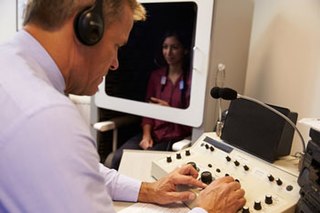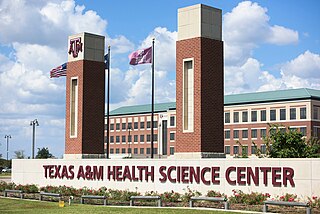Professional development is learning to earn or maintain professional credentials such as academic degrees to formal coursework, attending conferences, and informal learning opportunities situated in practice. It has been described as intensive and collaborative, ideally incorporating an evaluative stage. There are a variety of approaches to professional development, including consultation, coaching, communities of practice, lesson study, mentoring, reflective supervision and technical assistance.

A physician assistant in the US, or physician associate in the UK (PA) is a health care practitioner who practices medicine in collaboration with or under the (indirect) supervision of a physician, depending on state laws. Physicians do not need to be on-site with PAs and collaboration or supervision often occurs via electronic means when consults are necessary. Their scope of practice varies by jurisdiction and healthcare setting.

Audiology is a branch of science that studies hearing, balance, and related disorders. Audiologists treat those with hearing loss and proactively prevent related damage. By employing various testing strategies, audiologists aim to determine whether someone has normal sensitivity to sounds. If hearing loss is identified, audiologists determine which portions of hearing are affected, to what degree, and where the lesion causing the hearing loss is found. If an audiologist determines that a hearing loss or vestibular abnormality is present he or she will provide recommendations for interventions or rehabilitation.
Clinical governance is a systematic approach to maintaining and improving the quality of patient care within the National Health Service, (NHS). Clinical governance became important in health care after the Bristol heart scandal in 1995, during which an anaesthetist, Dr Stephen Bolsin, exposed the high mortality rate for paediatric cardiac surgery at the Bristol Royal Infirmary. It was originally elaborated within the United Kingdom National Health Service (NHS), and its most widely cited formal definition describes it as:
A framework through which NHS organisations are accountable for continually improving the quality of their services and safeguarding high standards of care by creating an environment in which excellence in clinical care will flourish.
A medical assistant, also known as a "clinical assistant" or healthcare assistant in the USA is an allied health professional who supports the work of physicians and other health professionals, usually in a clinic setting. Medical assistants can become certified through an accredited program. Medical assistants perform routine tasks and procedures in a medical clinic.

A medical laboratory scientist (MLS), also traditionally referred to as a clinical laboratory scientist (CLS), or medical technologist (MT), is a healthcare professional who performs chemical, hematological, immunologic, histopathological, cytopathological, microscopic, and bacteriological diagnostic analyses on body fluids such as blood, urine, sputum, stool, cerebrospinal fluid (CSF), peritoneal fluid, pericardial fluid, and synovial fluid, as well as other specimens. Medical laboratory scientists work in clinical laboratories at hospitals, reference labs, biotechnology labs and non-clinical industrial labs.
Nursing credentials and certifications are the various credentials and certifications that a person must have to practice nursing legally. Nurses' postnominal letters reflect their credentials—that is, their achievements in nursing education, licensure, certification, and fellowship. The letters usually appear in the following order:

Radiographers, also known as radiologic technologists, diagnostic radiographers and medical radiation technologists are healthcare professionals who specialise in the imaging of human anatomy for the diagnosis and treatment of pathology. Radiographers are infrequently, and almost always erroneously, known as x-ray technicians. In countries that use the title radiologic technologist they are often informally referred to as techs in the clinical environment; this phrase has emerged in popular culture such as television programmes. The term radiographer can also refer to a therapeutic radiographer, also known as a radiation therapist.

The Texas A&M Health Science Center, a component of Texas A&M University, offers health professions research and education in dentistry, medicine, nursing, biomedical sciences, public health, and pharmacy. It was established in 1999 as an independent institution of the Texas A&M University System and received accreditation in December 2002 from the Southern Association of Colleges and Schools to award baccalaureate, master’s, doctoral and professional degrees. The institution merged with Texas A&M University proper on July 12, 2013.
The Royal Australasian College of Surgeons (RACS) is the leading advocate for surgical standards, professionalism and surgical education in Australia and New Zealand.
Health information management (HIM) is information management applied to health and health care. It is the practice of acquiring, analyzing and protecting digital and traditional medical information vital to providing quality patient care. With the widespread computerization of health records, traditional (paper-based) records are being replaced with electronic health records (EHRs). The tools of health informatics and health information technology are continually improving to bring greater efficiency to information management in the health care sector. Both hospital information systems and Human Resource for Health Information System (HRHIS) are common implementations of HIM.
Health advocacy encompasses direct service to the individual or family as well as activities that promote health and access to health care in communities and the larger public. Advocates support and promote the rights of the patient in the health care arena, help build capacity to improve community health and enhance health policy initiatives focused on available, safe and quality care. Health advocates are best suited to address the challenge of patient-centered care in our complex healthcare system. The Institute of Medicine (IOM) defines patient-centered care as: Health care that establishes a partnership among practitioners, patients, and their families to ensure that decisions respect patients’ wants, needs, and preferences and that patients have the education and support they need to make decisions and participate in their own care. Patient-centered care is also one of the overreaching goals of health advocacy, in addition to safer medical systems, and greater patient involvement in healthcare delivery and design.
Mid-level practitioners, also called assistant practice clinicians and non-physician practitioner, are trained health care providers who have a defined scope of practice. This means that they are trained and legally permitted to provide healthcare in fewer situations than physicians and some other health professionals, but in more than other health professionals. For example, a mid-level provider may be trained for and legally permitted to perform some surgical procedures, but not others. They may have extensive education and a formal certificate and accreditation through the licensing bodies in their jurisdictions.
The Royal Dental Hospital of Melbourne (RDHM) is based in Carlton, just north of Melbourne’s CBD, and provides general, specialist and emergency dental care to all eligible Victorians. It is also a teaching hospital, which means patients may be treated by a variety of dental professionals, students, specialists in training, or other qualified staff.
Unlicensed assistive personnel (UAP) are paraprofessionals who assist individuals with physical disabilities, mental impairments, and other health care needs with their activities of daily living (ADLs). UAPs also provide bedside care—including basic nursing procedures—all under the supervision of a registered nurse, licensed practical nurse or other health care professional. UAPs must demonstrate their ability and competence before gaining any expanded responsibilities in a clinical setting. While providing this care, UAPs offer compassion and patience and are part of the patient's healthcare support system. Communication between UAPs and registered nurses (RNs) is key as they are working together in their patients' best interests. The scope of care UAPs are responsible for is delegated by RNs or other clinical licensed professionals.
The Faculty of Sexual and Reproductive Healthcare (FSRH) is a faculty of the Royal College of Obstetricians and Gynaecologists. It is the standard-setting organisation for family planning and sexual health physicians in the United Kingdom.
The College of Health Care Professions (CHCP) is a private for-profit school of allied health professions with its headquarters in Houston, Texas and multiple campuses throughout the state.

Ashton College is a private, post-secondary educational institution, with campuses located in Vancouver and Abbotsford in British Columbia, Canada. It was founded in 1998 to help newcomers to Canada get local credentials. Ashton College offers adult programs and courses in business, finance, immigration consulting, human resources, health care, human services, and other professional fields.





